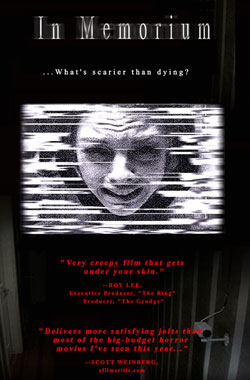When I went to ComicCon 2012, I met a whole heapin' helpin' of new people. It was a creative-types extravaganza. One of the people I met was actress Johanna Watts. After chatting, she wanted to read NOCTURNAL, and I wanted to watch one of her movies, an indie horror flick called IN MEMORIUM, so the ol' "artistic switcheroo" plot was hatched.
IN MEMORIUM was a 2005 micro-budget flick, so it took me a bit to track it down. If you want to watch it, it's streamable on Vudu for a couple of bucks (and that's Johanna's crying face in the movie poster at right).
I'll get to my question for you in just a moment.
But first, I enjoyed the movie. I've written a one-location screenplay myself, so I understand the challenges of writing a horror plot that can be shot on a low budget, or even no budget at all. You need to justify isolation, so your characters have to stay in that one setting and can't get help from expensive extras. The plot has to incorporate your budget! It was fun to watch what writer/director Amanda Gusack did to achieve that isolation.
IN MEMORIUM is a variation on the "found footage" style of filmmaking seen in THE BLAIR WITCH PROJECT. The protagonist is dying of cancer. He and his girlfriend (Watts) move into a house and wire it top to bottom with security cameras, so he can make a documentary on his final year of life. Those cameras, of course, catch a lot of other activity, very spooky activity, that no one would have seen without these ever-present (and plot-justified) cameras. Like BLIAR WITCH, the milieu even incoporates low-quality cameras, so footage that looks "bad" still feels "right."
Now, to my question. I finish the movie and see that's poorly rated on Vudu. I can understand why: if you're just watching this movie and not accounting for a non-existent budget, there are a lot of problems with it. If, however, you have any level of experience in making movies (even my tiny amount of knowledge based on writing a couple of screenplays and shooting a few book trailers), you can see the places in the movie where an FX budget would have fixed a ton of issues. But, Gusack didn't have the money hose needed to create an FX-ladden flick. She found a way to write a compelling horror story, cast it, shoot it, and actually get the thing made; that's an amazing accomplishment in itself.
So, I ask you -- when you're reviewing a movie, do you give it "bonus points" for trying if it is low-budget? Do you bump a 3-star flick up to 3.5, or even 4, if you can see they didn't have the money to make the movie what it should have been? Or, do you simply judge a movie as-is? Do you say to yourself "they knew their budget, they should have written something they could accomplish?"
A low-budget flick can even influence my opinion of the acting. If you've got the money to pay John Malkovitch, you get one product. If you're asking the actors you know to work for free for a week or more, you get another. I know how hard it is to make anything that involves a cast and crew, so I take that into consideration when I'm watching. I thought Watts did a great job. I wasn't as crazy about Erik McDowell's role as the male lead, but the budget limitations made me appreciate the performance whereas if he delivered the same effort on a big-budget flick, I might have felt more critical about it.
What are your thoughts? Budget: does it affect your perception of an artisitic effort?



